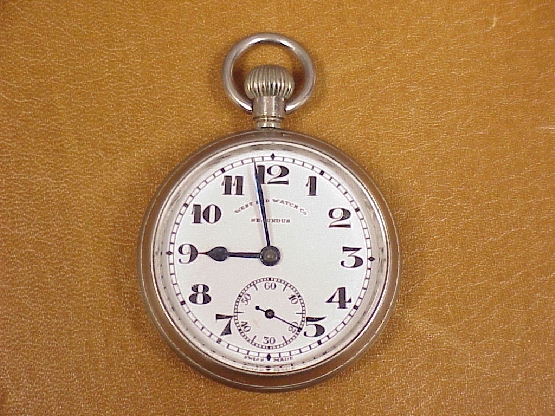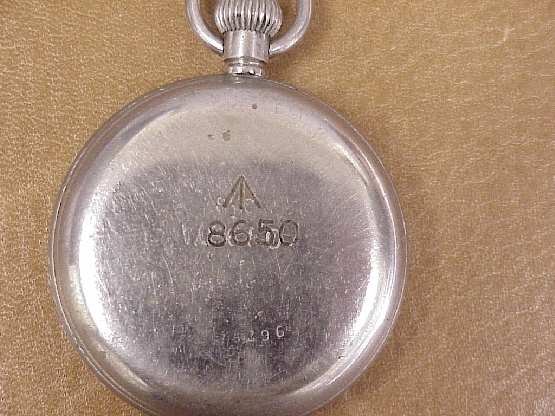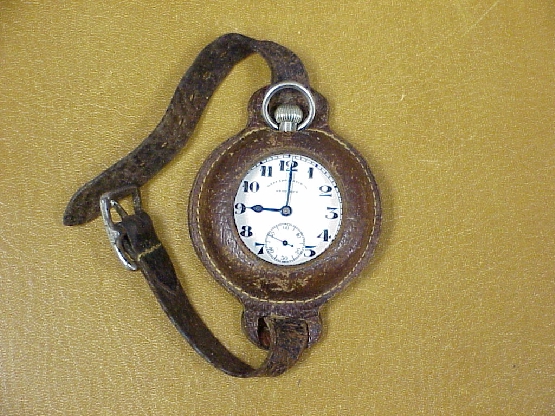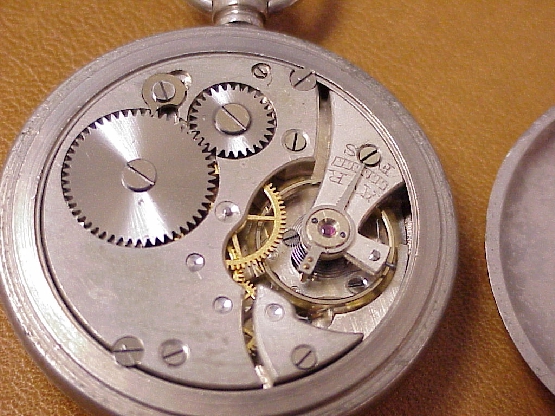
| WWT Shows | CLICK TO: Join and Support Internet Horology Club 185™ | IHC185™ Forums |

|
• Check Out Our... • • TWO Book Offer! • |
Welcome Aboard IHC185™  Internet Horology Club 185
Internet Horology Club 185  IHC185™ Discussion Site Main Page
IHC185™ Discussion Site Main Page  Horological Discussions, Questions and Answers
Horological Discussions, Questions and Answers  Military Timepiece Discussions - EXCLUSIVE!
Military Timepiece Discussions - EXCLUSIVE!  A LILLIPUTIAN MILITARY... POCKET/WRISTWATCH ?
A LILLIPUTIAN MILITARY... POCKET/WRISTWATCH ?
 Internet Horology Club 185
Internet Horology Club 185  IHC185™ Discussion Site Main Page
IHC185™ Discussion Site Main Page  Horological Discussions, Questions and Answers
Horological Discussions, Questions and Answers  Military Timepiece Discussions - EXCLUSIVE!
Military Timepiece Discussions - EXCLUSIVE!  A LILLIPUTIAN MILITARY... POCKET/WRISTWATCH ?
A LILLIPUTIAN MILITARY... POCKET/WRISTWATCH ?Go  | New Topic  | Find-Or-Search  | Notify  | Tools  | Reply to Post  |  |
| Life Achievement Military Expert |
The seller of this West End Watch Co. military pocket watch was located in India. He had two of these watches, each marked with the British Government Broad Arrow. In the images the watches looked like standard British issue service watches, perhaps of WWI vintage. So I bought one. Imagine my dismay when I opened the box. In place of the 16 to 18 size watch I was expecting was a watch with an external case diameter of 1 and 17/32 inches. A woman’s watch in size ..... but military in markings and appearance? And what of the WEST END WATCH CO. on the porcelain dial? The West End Watch Co. The brand name, West End Watch Co. was first registered in 1883. It was used by the Indian branch of the Swiss watch company, Droz & Fils, of St. Imier. By 1895, the parent company of West End Watch Co. was listed as Droz & Amstutz with main offices in Bombay, India. The Droz series of companies did a lot of business in India and registered a number of brand names for this market. Eventually, I noticed a few West End Watches marked, Bombay & Calcutta. At times, this brand was marketed to military personnel for private purchase. West End watches may have been used by the Indian Govt. after independence in 1947. Having earned a loyal following in India, The West End Watch Co. was in business at least into the late 20th century and may still be in business today. Most of the above information is from the two volume set, SWISS TIMEPIECE MAKERS 1775-1975, by Kathleen H. Pritchard, as well as from personal observations.  | ||
|
| Life Achievement Military Expert |
The markings on the case back are interesting. A rotary tool was used to cut a broad arrow and an issue number 8650. Rotary cutting tools were used to mark other British military timepieces of WWII and pre-WWII vintage. This mark is repeated inside the snap-off case back. Repeating the issue number and broad arrow inside the case back is a procedure I had not noticed before I obtained this watch, but it apparently was done. But now the interesting part. With magnification, it is possible to more clearly see a well worn earlier marking on the outside of the case consisting of, “SIS”, with broad arrow over the central letter I. Under this SIS mark is the letter “W” in front of the same “8650" issue number - “W8650". These markings may explain why the British Army in India was issuing these little pocket watches. A review of the British timepiece markings listed in, A CONCISE GUIDE TO MILITARY TIMEPIECES by Z.M. Wesolowski provided clues as to the original issue of this little timepiece. The marking, “SIS” (with broad arrow over the “I”) is identified by Wesolowski as a, “service wristwatch mark, Indian Army, c. 1930.” What of the “W” originally marked in front of the issue number? Wesolowski has a somewhat similar mark in his book consisting of “W...serial number....S”, which is identified as a, “wristwatch, service pattern mark flanking serial number, c. 1918."  | |||
|
| Life Achievement Military Expert |
The fact that the original issue markings were wristwatch markings is significant. Photographic evidence shows that during WWI (1914-1918) pocket watches were frequently used as wristwatches in wrist adaptors. When wrist adaptors were used, small pocket watches were often used with them, given that a small pocket watch would have been far more convenient than having a big clunky man-size pocket watch strapped on a soldier’s wrist. As in the image, the little West End Secondus is a perfect fit in a WWI vintage pocket watch wrist adaptor in my collection. These wrist adaptors came in various sizes, so it was a fortunate coincidence that a wrist adaptor found years ago in a local antique shop would be an excellent fit for a little pocket watch shipped in from far-off India. Until some other information is revealed, my research supports the following theory: During WWI supplies, such as wristwatches, went directly to the front and not to the troops in far-off India. For this reason, a British quartermaster in India would have been forced to purchase what could be found locally. Thus, small pocket watches were purchased from the local West End Watch Co. in either Bombay or Calcutta, along with wrist adaptors to fit them. Because they were to be used on the wrist, these watches were marked with wristwatch or “wristlet” markings, per regulations. After WWI, this watch must have remained in military service. At some point it was sent in to be cleaned and repaired. During inspection, the original military markings were found to be much to faint and hard to read, so the broad arrow and issue numbers were re-cut into the back of the little watch in accord with regulations. Why it did not receive wristwatch service markings is still a question. I would suppose that if it was in for repair without the wristwatch adapter, it may not have been recognized as a wristwatch when the broad arrow was being re-cut into the case back.  | |||
|
| Life Achievement Military Expert |
This image is of the 7 jewel Swiss movement. Still working quite well considering that it has been through one or two World Wars, and the time and distance it has traveled through. A leather wrist adaptor may have provided extra protection for the watch while it was used in Military service. Best regards, Greg  | |||
|
Interesting postings. There is another thread on this board that makes reference to West End Watch Co. https://ihc185.infopop.cc/eve/forums?a=tpc&s=3206049661&f=9886029761&m=433101574&r=997102774#997102774 | ||||
|
Greg, Great research and an interesting watch. I can picture that being worn by a Gerke in the 77th Bengal Lancers. Tom | ||||
|
| IHC President Life Member |
You do a great job Greg! Keep'em flying, Lindell | |||
|
| Life Achievement Military Expert |
Thank you for your comments and information. I posted a link regarding this discussion on WWW.Broadarrow.net Those who frequent the broadarrow board include quite a few experts in vintage military timepieces. It will be interesting to see what they make of this little West End and of my theory. Best regards, Greg | |||
|
| Life Achievement Military Expert |
PORTE OIGNON STRAPS One of the regulars on broadarrow.net referred to pocket watch/wrist straps as, “porte oignon straps.” I think that means ‘onion carrier’ in French? | |||
|
| Powered by Social Strata |
| Your request is being processed... |
|
Welcome Aboard IHC185™  Internet Horology Club 185
Internet Horology Club 185  IHC185™ Discussion Site Main Page
IHC185™ Discussion Site Main Page  Horological Discussions, Questions and Answers
Horological Discussions, Questions and Answers  Military Timepiece Discussions - EXCLUSIVE!
Military Timepiece Discussions - EXCLUSIVE!  A LILLIPUTIAN MILITARY... POCKET/WRISTWATCH ?
A LILLIPUTIAN MILITARY... POCKET/WRISTWATCH ?
 Internet Horology Club 185
Internet Horology Club 185  IHC185™ Discussion Site Main Page
IHC185™ Discussion Site Main Page  Horological Discussions, Questions and Answers
Horological Discussions, Questions and Answers  Military Timepiece Discussions - EXCLUSIVE!
Military Timepiece Discussions - EXCLUSIVE!  A LILLIPUTIAN MILITARY... POCKET/WRISTWATCH ?
A LILLIPUTIAN MILITARY... POCKET/WRISTWATCH ?©2002-2025 Internet Horology Club 185™ - Lindell V. Riddle President - All Rights Reserved Worldwide

